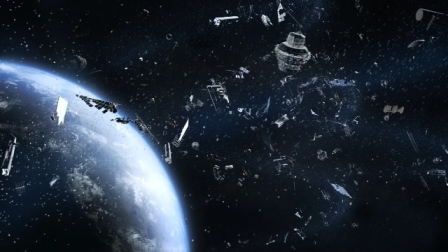Context:
In the vast expanse of space, humanity's reach has extended beyond the confines of Earth, facilitated by the deployment of satellites and spacecraft. However, with this expansion comes a pressing concern: space debris. The proliferation of satellites, rockets, and defunct spacecraft has cluttered Earth's orbit, posing a significant threat to operational assets and future missions. Addressing this challenge demands innovative solutions and concerted efforts from space agencies worldwide.

ISRO's Zero Orbital Debris Milestone:
The Indian Space Research Organisation (ISRO) recently achieved a remarkable milestone in space debris mitigation through its PSLV-C58/XPoSat mission. This mission stands as a testament to ISRO's commitment to responsible space exploration. Central to this achievement was the transformation of the final stage of the Polar Satellite Launch Vehicle (PSLV) into the PSLV Orbital Experimental Module-3 (POEM-3). By repurposing this stage into an orbital station, ISRO ensured that it did not contribute to the burgeoning debris dilemma in Earth's orbit.
The Purpose and Function of POEM-3:
POEM-3, developed by the Vikram Sarabhai Space Centre (VSSC), represents a paradigm shift in space platform utilization. This innovative approach leverages the spent fourth stage of a PSLV rocket to serve as an orbital platform for scientific experimentation. Equipped with solar panels, a lithium-ion battery, and a navigation, guidance, and control (NGC) system, POEM-3 embodies efficiency and versatility in space operations. Its NGC system, comprising sun sensors, a magnetometer, and gyroscopes, ensures precise altitude stabilization, while communication with ISRO's NavIC satellite constellation facilitates navigation.
Moreover, POEM-3 features a telecommand system enabling seamless communication with ground stations, facilitating real-time data transmission and command execution. This multifaceted functionality underscores its role as a cost-effective and adaptable space platform. By repurposing spent rocket stages, ISRO not only reduces space debris but also maximizes resource utilization, embodying sustainability in space exploration.
Contributions to Space Debris Mitigation:
ISRO's utilization of POEM-3 represents a significant stride towards mitigating space debris proliferation. By transforming the spent fourth stage of the PSLV into a functional orbital platform, ISRO effectively removes a potential source of debris from Earth's orbit. The controlled de-orbiting process, coupled with fuel dumping to prevent explosions, ensures that POEM-3 re-enters Earth's atmosphere safely, minimizing the risk of fragmentation and subsequent debris generation.
Furthermore, POEM-3's operational capabilities extend beyond debris mitigation, encompassing scientific experimentation and technology demonstration. The deployment of nine payloads, including those from VSSC, Bellatrix Aerospace Pvt Ltd, and various startups and institutions, underscores the platform's versatility and utility. These payloads conducted a myriad of experiments, ranging from power generation demonstrations to data collection and analysis, showcasing POEM-3's potential as a robust space platform.
Risks Posed by Space Debris:
The proliferation of space debris poses multifaceted risks to operational assets and future space missions. As the number of satellites and space activities continues to escalate, the likelihood of collisions and on-orbit breakup events increases substantially. Space debris, traveling at velocities exceeding 27,000 km/hr, poses a formidable threat to functional spacecraft, risking mission integrity and satellite functionality.
Moreover, the accumulation of space debris in Earth's orbit creates hazardous regions where collision probabilities are elevated, fostering a cascade effect known as the Kessler syndrome. This phenomenon, characterized by successive collisions generating additional debris, perpetuates a cycle of space clutter and exacerbates the risk to space assets. Consequently, spacefaring nations face mounting challenges in safeguarding their satellites and mitigating the adverse impacts of debris proliferation.
Addressing the Space Debris Challenge:
In light of the escalating space debris threat, space agencies worldwide are actively pursuing measures to mitigate its proliferation. ISRO's pioneering utilization of POEM-3 exemplifies one such approach, emphasizing the importance of responsible space exploration and sustainable practices. By repurposing spent rocket stages and facilitating controlled de-orbiting, ISRO sets a precedent for debris mitigation efforts in the space community.
Furthermore, international collaboration and adherence to established guidelines, such as the Space Debris Mitigation Guidelines 2002, are imperative for effective debris management. The Inter-Agency Space Debris Coordination Committee (IADC) and the United Nations play pivotal roles in promoting dialogue and cooperation among spacefaring nations. By fostering consensus and standardizing mitigation practices, these entities contribute to a collective effort to preserve the integrity of Earth's orbit and ensure the long-term sustainability of space activities.
Conclusion:
The advent of space exploration has ushered in a new era of human ingenuity and scientific discovery. However, this journey is not without its challenges, chief among them being the proliferation of space debris. ISRO's recent milestone in achieving practically zero orbital debris through the PSLV-C58/XPoSat mission underscores the importance of proactive debris mitigation strategies.
By repurposing spent rocket stages and leveraging innovative technologies like POEM-3, ISRO demonstrates its commitment to responsible space exploration and sustainability. Moreover, this achievement serves as a catalyst for broader international collaboration and concerted efforts to address the space debris challenge. As we venture further into the cosmos, safeguarding Earth's orbit and preserving the integrity of space assets remain paramount objectives for the global space community.
|
Probable Questions for UPSC Mains Exam 1. Space debris poses a significant threat to operational assets and future space missions. Analyze the risks associated with space debris proliferation, highlighting its potential impacts on satellite functionality and mission integrity. Evaluate the efficacy of international collaboration and adherence to established guidelines in mitigating the adverse effects of space debris. (10 marks, 150 words) 2. Responsible space exploration necessitates proactive measures to mitigate the risks associated w`ith space debris. Evaluate the effectiveness of ISRO's approach in achieving practically zero orbital debris through the utilization of innovative technologies. Discuss the implications of ISRO's milestone on the broader landscape of space exploration and the role of space agencies in ensuring the long-term sustainability of space activities. (15 marks, 250 words) |
Source: The Hindu








